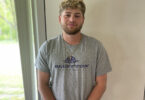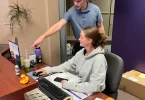By Caleb Nesbit
The first of two scheduled training events for mental health first aid took place Dec. 1. The class provide those in attendance with the information to be able to give initial help to people experiencing problems such as depression, anxiety disorders, psychosis and substance disorders.
This class is a revised version with the original teachings coming from Australia. The original course was 12 hours long, but was reduced to only eight hours for the United States version. The first half of the day focused on how to help those afflicted with depression, anxiety disorders, and presenting behavior that suggested thinking about suicide.
During the first portion, the ALGEE method was taught, the acronym stands for the action plan. Action A: Assess for risk of suicide or harm. Action L: Listen nonjudgmentally. Action G: Give reassurance and information. Action E: Encourage appropriate professional help. Action E: Encourage self-help and other support strategies.
This action plan was carried out in groups in the class and also observed watching videos provided to replicate real-life scenarios.
During the second portion of the training, the focus shifted to handling and understanding psychosis and substance abuse. Psychosis was explained to be a mental disorder in which a person has lost some contact with reality, resulting in severe disturbances in thinking, emotion and behavior.
Statistics for substance abuse were also provided, ranging from when the disorder crops up, factors that increase the risk of acquiring the disorder and percentages of people having it. Proper serving sizes for alcoholic beverages were also provided and noted the allowance per week for both males and females before it becomes a disorder.
The proper technique for helping somebody that has passed out from substance use was taught, starting with calling 911 immediately and then moving the person onto their side and keeping them from rolling over.
Sienna Sullivan, sophomore criminal justice major and resident advisor, attended the event.
“I thought the class was very good in terms of feeling involved and being interactive,” said Sullivan. “I think it was taught very well but it was just the surface information and I felt like with the group we had I wish it was more detailed. Even though it was a lot of surface material, I still feel like I learned more detail things to do during crisis situations.”
One of the instructors of the class, Donna Dickman, executive director of the Partnership for Violence Free of Families, expressed what she wanted to be taken away from the class.
“I wanted for the participants to take away more knowledge on mental health and local resources,” said Dickman.
Dickman said the organization is working with all five colleges around the area due to the fact that the age group of 18 to 24 is the most prone to suicide, and she wants to provide the resources to be able to help people in need.
The next mental health first aid class being provided at Bluffton will be on Feb. 3, 2019, and will also grant a certification to those who attend and complete the course.






